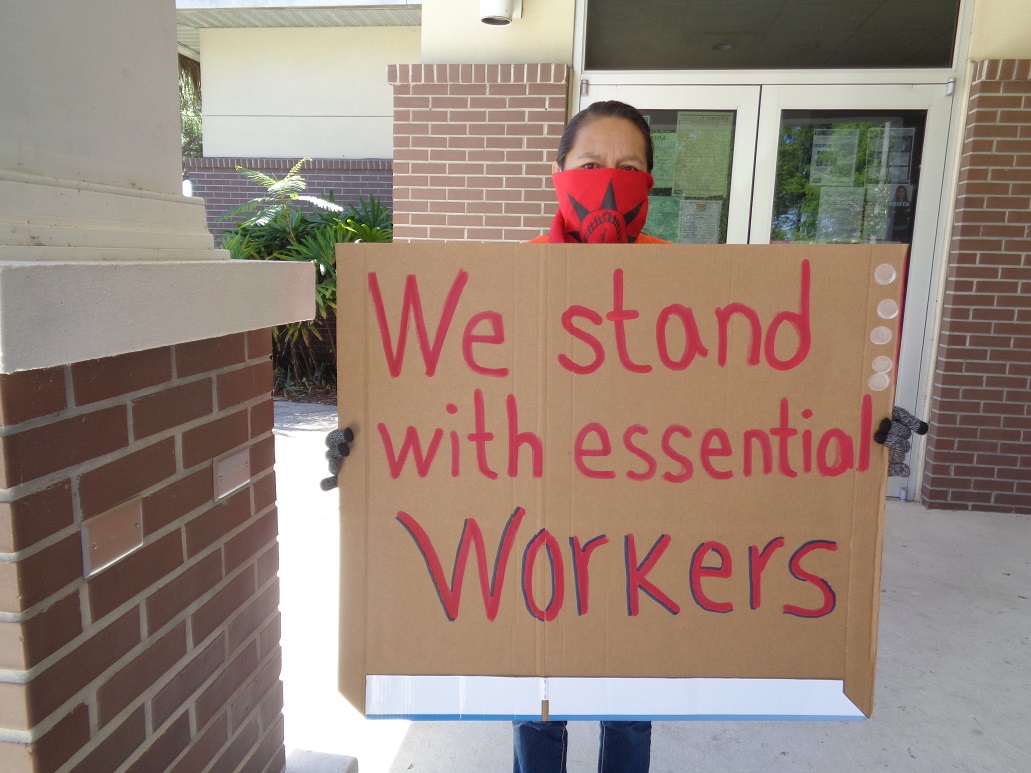COVID-19 Response
One of the Farmworker Association of Florida (FWAF) in 2021 priorities continues to be to inform and support the communities we serve with regard to COVID-19 and vaccination information. We encourage safe practices and work to meet the current and emerging needs of our communities while at the same time ensuring the safety and health of our staff. A year into the COVID-19 pandemic our focus is providing language and culture-appropriate videos, text messages, and social media posts in Spanish, Haitian Creole, and indigenous languages about COVID-19 vaccines.
In response to the explosion of community needs related to the pandemic, we shifted from community organizing and social justice to largely providing services. Staff members assist community members with completing Medicaid, Food Stamps, and unemployment applications. We also provide direct assistance with rent, utilities, and other critical expenses as well as organizing food and mask distributions in each of the five communities where we work.
Building a ‘new normal’ future
FWAF’s Campesinos’ (community) Gardens continue to function, with adherence to careful safety and social distancing requirements. The intention is to demonstrate in a concrete way the importance and value of local food sovereignty and that the Gardens function as an important, albeit limited, source of fresh and healthy food for families during this critical time. We encourage sourcing and supporting the creation of backyard gardens. FWAF is continuing to provide training on gardening, agroecology, and the use of medicinal herbs.
Early pandemic
In Mach of 2020 the emergence of the COVID-19 pandemic, made it clear that FWAF would need to make dramatic changes in the way we do our work. Our mission of “building power in farmworker and rural low-income communities” in central and south Florida involves working directly with individuals and in group gatherings. By the end of March, it was clear that this would have to change. Our priorities shifted to providing information and direct support to the communities where we work while at the same time encouraging safe practices within the community and ensuring the safety and health of our staff.
Info in Spanish, Haitian Creole, and Indigenous languages
In late March and into April, as information about the virus became available, we placed emphasis on getting language (Spanish, Haitian Creole, Indigenous) and culturally appropriate information to our communities via text, video, radio announcements, and flyers. Much of what was available through the media and government sources was only provided in English and in many cases minimally available in the rural communities where we work. When various forms of government assistance became available, FWAF provided this information to the communities as well.
Job loss for entire households
Although essential workers, even in the best of times farmworkers are low-paid, often exploited and, for the most part, live from paycheck to paycheck. The pandemic has resulted in loss of income and in many cases the loss of jobs for entire households. As the economy began to slow and shut down, we witnessed a tremendous need in the community. Those who were able to continue working or returned to work, in most cases, worked in unsafe conditions, risking their own health and that of their family and community for the sake of maintaining an income.
Continued Support
In order not to contribute to the spread of the virus, most of FWAF’s in-person programs were suspended. To the extent possible, we provide support remotely, through phone calls, text, and Facebook postings. However, throughout this period we have continued providing in-person support. Early on, we implemented careful hygiene and safety protocols in our offices, including requiring face masks and hand washing, limiting the number of people in each office at any particular time, and ensuring that surfaces are cleaned after each encounter.

